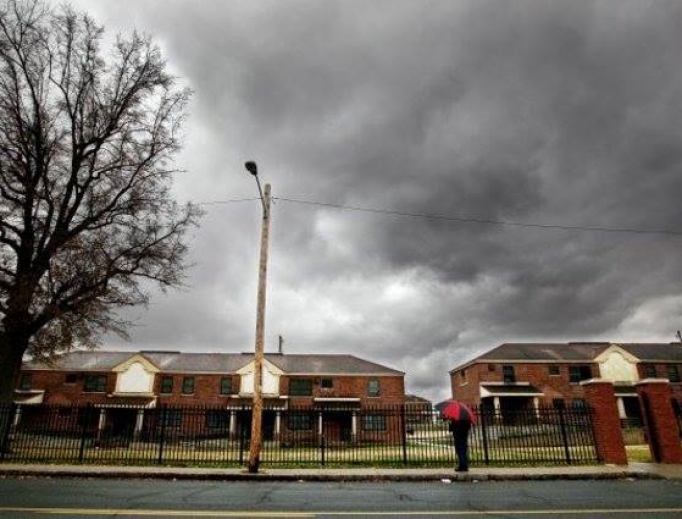‘It’s the Bond Between All of Us That Holds Us Together’
America Lost documentary sheds lights on importance of the bonds of faith, family and community amid social distancing.

The fabric of American society is coming apart at the seams. Numerous books, editorials and podcasts have testified to that fact. Now, with federally recommended and state-mandated social distancing, communal bonds are simultaneously more strained and more urgently needed. Faith becomes something practiced privately or livestreamed. Family may feel smothered when sheltering together, distant if sheltering apart. If the COVID-19 crisis has illustrated anything, it has shown, by dint of absence and suspension, how important social bonds are. In reestablishing them, one could hardly look for better inspiration than Christopher Rufo’s America Lost.
Rufo, a filmmaker, writer and director of the Discovery Institute’s Center on Wealth & Poverty, spent five years on the legwork for this, his fourth film. He lived in Youngstown, Ohio; Memphis, Tennessee; and Stockton, California, getting to know their residents: people like Contrina, raising her two daughters as a single mom and selling meals to get by; Nicki, facing the tough decision of staying in her dying town with her mom or leaving to find a better life; and Todd, who scavenges abandoned houses for scrap metal and materials to create artwork. As Rufo follows his subjects through the film, he weaves their stories into a narrative at once bleak and hopeful.
“These cities are places infused with a deep history,” Rufo told the Register. “In all three cities, there was an Edenic period in the 1950s that people still remember, even in communities that had been marginalized through poverty or segregation. Then things started falling apart, first economically, then socially, then spiritually. When those structures are gone, you start to see the greed, corruption, violence, despair, all of those dark parts of human nature.”
Interior Focus
The focus on Youngstown, Memphis and Stockton was deliberate. Rufo wanted to represent “all of the cities of the American interior. Youngstown is a white Northern city, Memphis is a black Southern city, and Stockton is a multiracial Western city. They are three cities that aren’t on everyone’s radar and don’t come with many preconceptions. They could easily be Braddock, Flint and Newark. Collectively, they represent all of the ‘forgotten cities’ throughout the United States.”
In the film, Rufo argues that these forgotten cities are harbingers of America’s future, calling Youngstown in particular “a symbol of what’s to come.”
“We’ve had economic changes before, but this is the first time our social institutions have collapsed as well. At heart, the crisis in America’s forgotten cities is a crisis of meaning. All of the old structures that once provided a solid foundation — faith, family, work, community — have slowly fallen apart. The real problem is not just economic, but deeply personal — human, even spiritual.”
The human crisis is severe. One interviewer, talking to an older Memphis lady whose grandchildren are playing by her in the yard, asks if she fears for her safety in the rundown neighborhood. “Yeah,” she says, and nods for a few seconds. “And I had a big dog, but somebody killed him; somebody poisoned him.”
“How do you protect yourself?” the interviewer asks.
The grandmother, in her response, invokes Providence. She smiles faintly. “Well, I mostly rely on faith. I figure like, if I’m a good person, God ain’t gonna let nothing happen that wasn’t supposed to happen, and if it happened, it was time, or it was supposed to happen, ’cause he don’t make no mistakes.”
Another of the film’s subjects, a young man named Joseph, has a different take on the principles at work. “One thing about being here in the city, if you’re poor, you’re poor. If you have, then, more than likely you have more than enough. It’s really just survival of the fittest, man. It’s survival of the fittest.” Having invoked that Darwinian principle, Joseph himself fails to survive. The film’s epilogue says that he “was arrested for felony assault and returned to prison.”
Edifying Endings
But many of the stories Rufo tells have happier endings.
Contrina, single-parenting her two daughters — one with an absent father, the other with a father in jail — reflects on her own father’s incarceration and tells her girls, “I just wanna break that cycle. First, I want you to finish school, finish high school; college is a must; get married before having kids. I wish the best for you all.”
Another of the film’s subjects, Michael, struggling to overcome a checkered past, ultimately finds full-time work to support his wife and two children. And it’s Michael, holding his newborn son, who voices the moral of Rufo’s story. Describing how he wants his boy to avoid the suffering that he went through, Michael paints a picture of familial solidarity: “And that way in the end, [my son] lives. He lives for us, his family, you know? And we all live for each other. Because in this world, that’s all we’ve got. It’s the bond between all of us that holds us together.”
Family is one bond; faith is another. In the film, Rufo says that “faith-based organizations are still the cornerstone of poor communities. In places like Stockton, inner-city churches are often the only remaining institutions that offer a clear sense of meaning, purpose and community.”
Faith, community, family — these are what lead men like Michael to let go of what he calls “that life out there in the streets: being on welfare, being on food stamps, living that kind of life, and really struggling.”
Michael says it was an inner rather than an outer compulsion that changed his life: “I think that it’s something instinctively inside myself, inside of all men: that you wanna work; you wanna provide. And I want there to be a time when my children can look to me and say, ‘That’s my dad, and I’m proud.’” Rufo picks up on this theme and makes it central to his documentary, arguing that solidarity is not something that can be engineered, but rather something that must grow from the ground up.
In voice-over, Rufo elaborates on Michael’s insights. “We’ve tried to solve our problems through top-down public policies, but I’ve learned that real change doesn’t happen from the top down; it happens from the inside out. It starts within each individual human heart, then slowly works its way outward to families, neighbors and communities. The solution for our forgotten cities is not just to revive their economies, but to create a new foundation for our fractured postmodern world. We must rediscover the traditional sources of meaning — faith, family, work and community — and adapt them to the modern condition.”
Community Everywhere
But the film’s illustration of the importance of subsidiary institutions does not let its viewers off the hook. Rufo is not selling the idea that people can pull themselves up by their own bootstraps. On the contrary, he suggests that viewers inspired by the film take its message home to their own communities.
He told the Register what people should do: “Listen. Form a relationship. Offer your emotional support. It’s about creating personal bonds and leading by example. Most of the people who are living on the edge have been set up to fail by their parents, their neighborhood, their school and their community. But in almost every case, they have a clear sense of what needs to be rebuilt. They have an instinctual moral understanding of how the world should be. For those of us on the outside, it’s our job to listen to them, lift up this vision, and clear the way so it can happen. And first, we have to stop thinking that ‘we’ — educated people, policymakers — know what the answer is for ‘them.’ That hasn't worked out, and I think we need to find another model.”
That solution in some ways helps America Lost stand out amid the recent spate of social-science books and films on the declining American dream. The other thing that helps the film stand out is its specificity. Rufo told the Register, “It’s one thing to look at a graph of American decline; it’s another to see it, feel it and hear it, right up close. I tried to capture the emotions of these places, the heartbreak, the complex character dynamics, and the visual impressions of these places.”
This strength of the film may also, in a sense, be its weakness. Where authors use charts and graphs to illustrate their claims, Rufo’s genre is necessarily — but not, he insists, merely — anecdotal.
“Family and religion have been the foundation of the human experience forever,” he told the Register. “Social science is less than 200 years old. I find it astonishing that people still believe that the answer to fundamental social problems can be found through applied social science. The track record isn’t very good. If you don’t have a functioning system of family, faith and local community, the policies really don’t matter; the society is gone. So I recommend that you start at the heart of things, in the places where you have actual agency — your family, your neighborhood, your city — and go from there.”
Sophia M. Feingold writes from Florida.
WATCH
Interested readers can view the film via download at AmericaLostFilm.com, or through Amazon.
Further Reading
Coming Apart, Charles Murray
Alienated America, Tim Carney
Hillbilly Elegy, J.D. Vance
Bowling Alone, Robert Putnam
The Benedict Option, Rod Dreher















